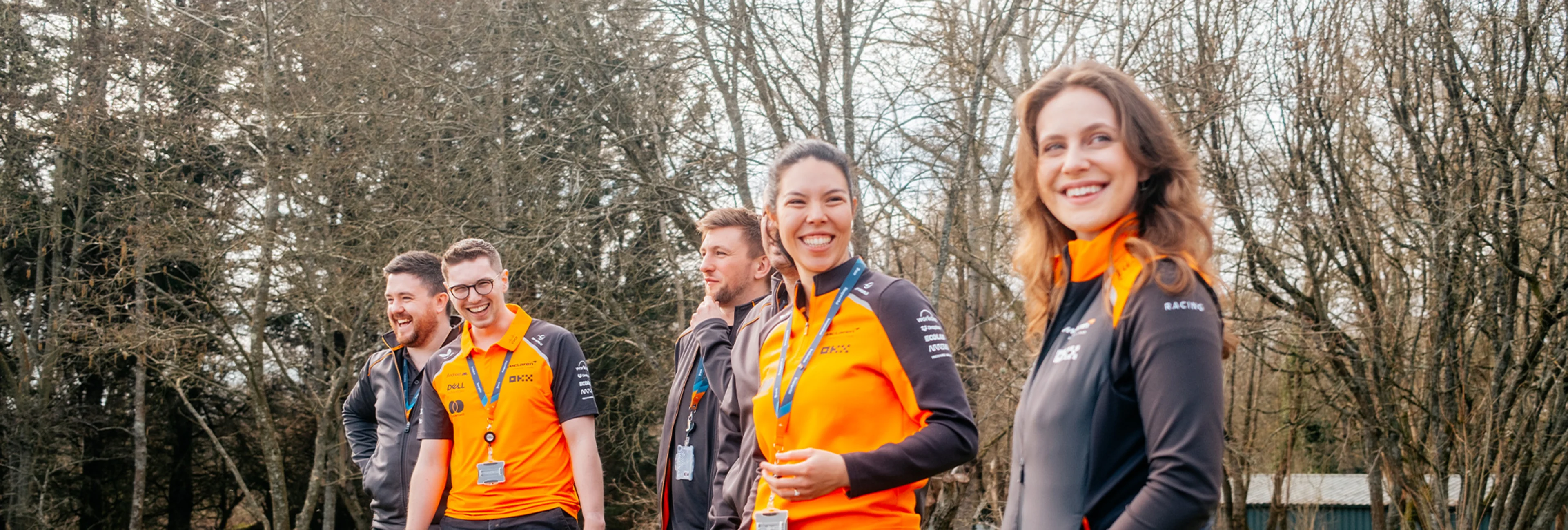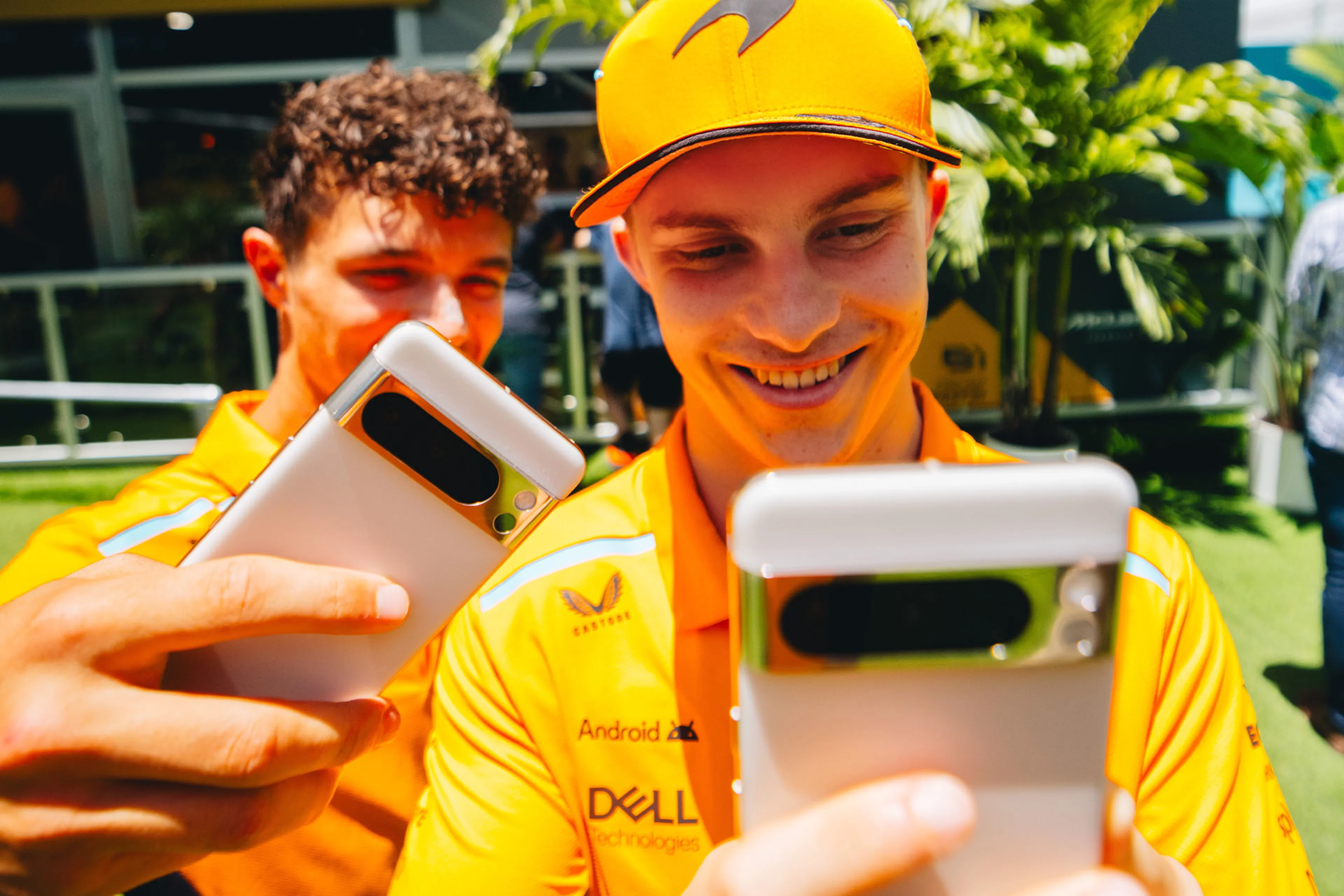

20 May 2025 10:00 (UTC)
An evolved framework, adopting the ‘racing mindset’, and embracing collaboration: everything you need to know about our fourth sustainability report
2024 was a season of success on and off track, as our Formula 1 team delivered McLaren’s first Constructors’ Championship since 1998, while making progress in our sustainability goals.
Our fourth annual Sustainability Report tells the story of another year of growth as we continue to work towards our ambitious targets, which include designing and building a circular F1 car, achieving net-zero emissions by 2040, and for 40% of our team members to be from underrepresented backgrounds.
To help you understand the key learnings and progress updates, we’ve broken down and condensed the five biggest takeaways from the report.


In the three years since we published our first official sustainability report, we’ve measured our progress and worked within four key pillars: Net Zero, Circular Economy, Diversity, Equity and Inclusion, and Health and Wellbeing. However, in 2024, we transitioned to an updated framework: People, Planet, and Performance.
This is our evolution of The Triple Bottom Line, a widely used strategic framework adopted by companies to account for and attribute value to environmental and social impact alongside financial performance.
Traditionally, The Triple Bottom Line refers to People, Planet, and Profit, but lap time is the currency of motorsport, so we’ve adapted the framework to reflect what we value most as a team: performance.
Our initial approach encouraged us to focus on four specific pillars, offering valuable structure during the early stages of our sustainability journey. However, as our work has evolved, we’ve recognised a need for a more flexible framework that would allow us to explore additional areas, such as nature.
People, Planet, and Performance also more closely links the projects we work on, fostering a more integrated approach that highlights how one area influences another: our circular economy efforts support our net-zero journey, build supply chain resilience, and improve performance through resource efficiency.
This can also be seen in our nature work at the McLaren Technology Centre, which includes planting initiatives and the installation of beehives. This supports local biodiversity while adding performance by improving the health and wellbeing of our people.
That this shift in thinking was made during our Championship-winning year proves that sustainability performance and on-track performance do not have to compete, but can work in tandem. It’s People, Planet and Performance, not ‘or’. Success in one of these areas can drive it in another.


Earlier this year, we launched our Never Stop Racing campaign, which explores how the ‘racing mindset’ can be applied in everyday life. Never Stop Racing is built on the belief that with determination, passion, and innovation, we can always go a bit further, and we’ve applied this practice to our sustainability efforts.
In addition to approaching sustainability with the same high-performance mindset as we do in our racing efforts, we’re also applying the same culture and practices as used in our racing endeavours. By using our motorsport knowledge and expertise, we can help solve climate and societal challenges.
We’re demonstrating this approach through our innovative work with the Great Barrier Reef Foundation to accelerate coral reef restoration, as well as with UNDO and Mombak, whom we’ve partnered with to accelerate the scaling of high-quality projects that remove excess carbon dioxide from the atmosphere and store it long term.
We’ve also been taking steps to adopt the same data-driven decision-making approach as our race teams. The recently launched F1 Constructors’ Circularity Handbook provides a robust and consistent methodology for tracking our progress in our ongoing efforts to design and build a circular F1 car. Using this new methodology, we were able to measure 37% material circularity in our F1 Constructor activities. This measures the proportion of recycled or regenerative materials incorporated into our F1 chassis development and manufacture, as well as the percentage of our factory waste that is reused, recycled, or otherwise kept in circulation.
Good data doesn’t just help you to overcome challenges, but to identify them in the first place. Throughout 2023 and 2024, in support of our ambitious Diversity, Equity and Inclusion (DE&I) goals, we focused on gathering more detailed baseline data from across our team. This will give us better visibility into where we need to improve, enabling us to enhance the impact and effectiveness of our outreach, recruitment, and engagement programmes.


If we want our people to adopt the ‘racing mindset’, then we must treat them in the same way we do our athletes: as elite talent that needs the right conditions to shine.
Over the past 12 months, as part of a longer-term plan, we’ve invested significantly in this area, most notably through the opening of the Optimum Nutrition McLaren Performance Hub (MPH) at our factory in Woking. This dedicated, multi-million-pound facility offers a comprehensive, state-of-the-art fitness and wellness experience.
Given the increasing demands our people face when they are at the track and on the move, through different time zones and climates, while away from loved ones, we have also increased the level of support we provide to our travelling team. This includes extensive pre-season health assessments, regular check-ups throughout the season, and access to medical professionals, including a doctor, physiotherapist, and therapist.
We must also continue to provide opportunities to individuals from underrepresented backgrounds, as this will increase our diversity of thought and ensure we’re getting an accurate representation of the world. If we can assemble a team with diverse perspectives and experiences, it will unlock new ideas and enhance our approach to working.
Currently, 33% of our team members come from underrepresented backgrounds, as we continue to make progress toward our goal of reaching 40% by 2030.
This is great in the short term, but long-lasting change will come from inspiring the next generation. To this aim, in 2024, our STEM ambassadors reached 7,623 students through our outreach programmes, such as McLaren Racing Engage. Meanwhile, our 60 Scholars programme entered its second year, whilst we founded two new internal networks, Racing Roots and Driving Pride, to expand the support we provide for our team members from underrepresented backgrounds.


We’ve set ambitious targets, including a commitment to halve our emissions by 2030 and achieve net-zero by 2040. These are only realistic because we’re not afraid to make bold decisions.
That includes a willingness to learn, adapt, and pivot. When we found a better way forward than our previous four-pillared approach to sustainability, we didn’t hesitate to change.
We adopted this same mindset when creating the F1 Constructors’ Circularity Handbook, as we sought to develop a new metric with very few existing examples to follow. We believe that the Handbook has the potential to promote industry-wide collaboration and hope that our fellow Formula 1 teams will also adopt it.
One of our goals for 2024 was to adopt lower-emission fuels across our operations, and by expanding our use of biofuels, we successfully halved our Formula 1 road freight emissions. However, we were aiming higher, and made an ambitious investment in a sustainable aviation fuel (SAF) programme.
While air travel remains a necessity in racing, in order to transport our people and equipment from one race to another, we are determined to make it more sustainable. In 2024, we funded the use of one million US gallons of sustainable aviation fuel. The fuel that we funded avoided 8,464 tonnes of CO2e GHG emissions in the aviation industry, equivalent to 14.7% of our annual footprint. Although the SAF industry is still in its early stages, our investment sends a clear signal of demand to the market and supports the advancement of lower-emission fuel alternatives.


We can’t do this alone. Our most significant successes and greatest impacts have resulted from authentic collaboration with partners who share our values and vision…
The F1 Constructors’ Circularity Handbook was developed in collaboration with Deloitte UK, the MPH was designed and built with the help of Optimum Nutrition, and our SAF programme was made possible through our partnership with Ecolab. We’ve also made significant strides in a short period with our Climate Contribution Programme partner, the Great Barrier Reef Foundation, identifying and prioritising opportunities to efficiently and effectively scale up and reduce the cost of current coral reef restoration efforts.
These are just a few high-profile examples. To support our Diversity, Equity, and Inclusion (DEI) targets, we partnered with Google, Cisco, and Deloitte UK to deliver the 2024 edition of the 60 Scholars programme, with learning and skills support from Udemy. We also welcomed a second cohort of four secondees as part of a 12-month work placement in the UK, supported by NEOM. In addition, FIA Girls on Track UK joined our McLaren Racing Engage Alliance, and we continued to collaborate with Creative Access, the Smallpeice Trust, and the Women’s Engineering Society.
We’ve also worked even more closely with the motorsport ecosystem to drive shared progress. The FIA commissioned the F1 Constructors’ Circularity Handbook, enabling all F1 Teams to take on the challenge of measuring and improving their circular practices. We have also worked with F1 itself, contributing to its new SAF programme for F1 air freight, participating in the development and signing of its Diversity and Inclusion Charter, and supporting the F1 Scholar programme through a dedicated scholarship.
And our participation in Formula E provided our female McLaren Development Drivers, Bianca Bustamante (2024) and Ella Lloyd (2025), an opportunity to drive the FE cars as part of the all-electric series’ Women’s Test.
You can read our 2024 Sustainability Report in full , while further information on our sustainability efforts and achievements to date can be found on our .



